At any one time there are between 40 and 50 doctoral students at Fraunhofer ISI - some are completing their theses, others are starting afresh on the doctoral program.
Here we would like to introduce some of the current doctoral students:
At any one time there are between 40 and 50 doctoral students at Fraunhofer ISI - some are completing their theses, others are starting afresh on the doctoral program.
Here we would like to introduce some of the current doctoral students:
Şirin joined Fraunhofer ISI in October 2020 as a research associate and doctoral student in the Energy Technology and Energy Systems Department. In her doctoral thesis, she is investigating the economics and role of heat pumps in European buildings, taking into account regional, temporal, and building-specific characteristics that affect heating costs for end users. The development of the regional building stock model is a key component of her thesis. She holds a bachelor's degree in chemical engineering and an MSc. in Sustainable Systems Engineering from the University of Freiburg. Her thesis is being supervised at the University of Freiburg.
University of Freiburg
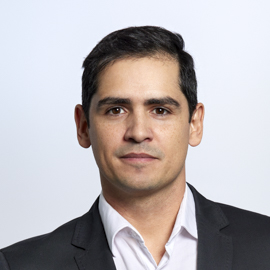
Denilton works in the Innovation and Knowledge Economy Department in the Business Unit Innovation Trends and Science Studies. His thesis explores the emergence of data-driven innovation, its identification, and how it influences firms' creation, performance, and science-industry linkage. Previous studies addressed mainly the data market and data economy sizing, but the microanalysis on the type of innovations, concerning a taxonomy of these products and services, its developing process, and how it reflects on the new firms and its linkage to science, is still missing. Thus, this research aims to fill this gap by analyzing DDI under four domains: technology, data sources, value-proposition, and business model. Such an analysis will serve as the basis for identifying data-driven innovative firms and pave the way for automatic identification and linkage (networks) of these firms and eventual common data sources.
University of Hohenheim
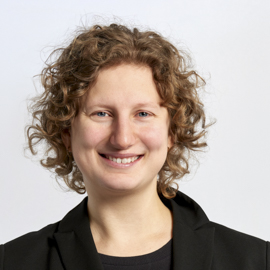
Elisabeth has been working as a research associate and doctoral student at Fraunhofer ISI in the Sustainability and Infrastructure Systems Department since 2019. Previously, she studied industrial engineering at the Karlsruhe Institute of Technology. In her thesis, she is researching digital eco-innovations and how they influence sustainable development. In order to assess this influence, she is developing a sustainability assessment that integrates the 17 Sustainable Development Goals and adds digitization-specific indicators. In two case studies, scenarios based on the future use of digital eco-innovations are designed and their sustainability is subsequently assessed in an iterative process using the developed methodology. The first case study is in the area of circular and digitized industry. The second case study will focus on behavioral change towards more sustainable behavior based on "better" information using digital innovations.
Berlin University of Technology

Hendrik has been working as a research assistant and doctoral student at the Policy and Society Department since February 2019. Building on a degree in Geography (B.Sc.) from the University of Marburg and a degree in Economic Geography (M.A.) from Leibniz University Hannover and Jagiellonian University Krakow, he has since been conducting research primarily on the regional dimension of knowledge, innovation, and transformation processes in different spatial contexts. In his thesis, he is investigating regional sustainability transitions in Germany. Specifically, it addresses the questions of which actors (in the sense of organizations) are key drivers of sustainable change or environmental innovation, whether and to what extent the roles of actors differ between regions, and how this diversity of transition processes is most likely to be explained by spatial factors (for example, technological capabilities, regional knowledge bases, regulatory and political frameworks). The methodological basis of the thesis is systematic literature analyses, regression models and qualitative interviews.
Leibniz University Hannover
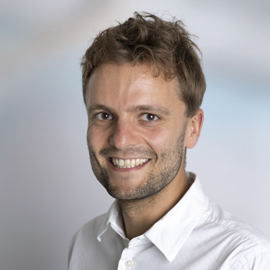
Sascha joined the Energy Policy and Energy Markets Department at Fraunhofer ISI as a research assistant in March 2018 and as a doctoral student in March 2021. He is part of the Climate Policy Business Unit and focuses on CO2 pricing, especially in the European Emissions Trading Scheme (EU ETS), national schemes such as the national emissions trading scheme in Germany and also on CO2 taxes. Before he joined Fraunhofer ISI, he worked for four years at Stuewe Management Consulting in Cologne. In 2012, he completed his studies in economics in Freiburg with a diploma. The focus of his studies was empirical econometric research and social policy. In his thesis, he analyzes trading behavior of regulated companies in the EU ETS using trading data from the European Union Transaction Log. In particular, he focuses on questions concerning the efficiency of the EU ETS and in particular, company characteristics that influence the trading behavior of regulated companies. The focus is on the following questions: How do the characteristics of individual companies and institutional features of the EU ETS influence companies’ trading behavior? Which companies trade more successfully? How were intra-company trading options used? How do companies adjust their trading strategies when free allocations phases out? The questions are addressed using econometric data analyses.
Karlsruhe Institute of Technology
Steffen has been working as a research assistant and doctoral student at Fraunhofer ISI in the Energy Technology and Energy Systems Department since August 2020. In this capacity, he is investigating decarbonization in road transport in particular in the Business Unit Energy Economy. Furthermore, he deals with application scenarios and the development prospects of different forms of battery technology within the scope of various projects. He studied industrial engineering with a focus on vehicle and drive technology (B. Sc. and M. Sc.) at Karlsruhe Institute of Technology. His thesis aims to model and optimize the interaction of in-vehicle battery storage and the charging infrastructure for heavy-duty commercial vehicles in Europe. In addition to the driving and usage behavior of the vehicles, the detailed technical consideration of the vehicle components (battery simulation, overall vehicle simulation) as well as the planning of the charging infrastructure play a decisive role. Using agent-based modeling, the decision of individual vehicle users (which battery size) and comparing them with the manufacturer's offer (which battery chemistry, which format, which module capacity) and the localization and dimensioning of charging infrastructure points (location, number, power) which will be modeled, simulated and analyzed within the framework of an optimization methodology.
Karlsruhe Institute of Technology – Elektrotechnisches Institut (ETI)
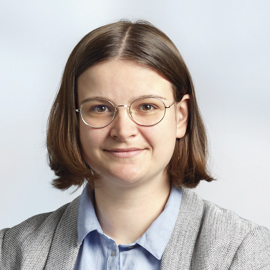
Thurid has been a research assistant and doctoral student in the Energy Technology and Energy Systems Department since October 2020. She studied industrial engineering with the specialization "Energy and Environmental Management" at Flensburg University of Applied Sciences (B. Eng.) and the European University Flensburg (M. Eng.). In her bachelor dissertation as well as in her master dissertation she dealt with concepts for industrial transformation (industrial symbiosis, use of molecular hydrogen in the primary resources industry). In her thesis she investigates the potential contribution of material-based strategies toward the decarbonization of primary resource industries in the context of the circular economy. To this end, she is modeling an inventory-oriented material flow of the basic materials, steel and cement, for use in buildings. These are both quantitatively relevant and also with regard to emissions. In addition, she is quantifying the impact of measures in the context of the circular economy as well as selected policy instruments.
Utrecht University
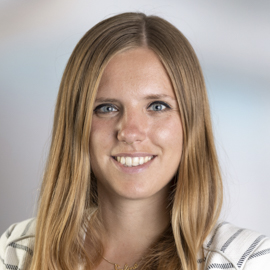
Since September 2018 Sabine has been a research associate in the Business Unit Demand Response and Smart Grids in the Energy Technology and Energy Systems Department. She is investigating approaches for integrating households into the energy system. Previously, she studied Systems Engineering, Policy Analysis and Management at Delft University of Technology. Her thesis focuses on the potential of households to contribute to a sustainable energy system sector with coupling technologies and small-scale renewable energy installations. However, due to lack of awareness and time and limited financial resources, actual participation is low. Private actors (for example, energy suppliers or aggregators) could support households, even with their limited resources (= at low transaction costs), to participate in the wider energy system. In her PhD, she asks how the contractual arrangements of private actors and the legal regulations of the energy industry contribute to the inclusion of households. Using a conceptual, empirical and model-based approach she investigates under which regulations the benefits for households and the energy system exceed the transaction costs of inclusion.
Delft University of Technology
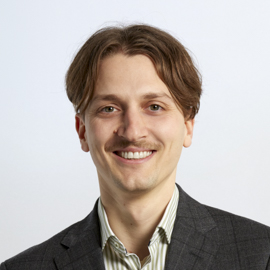
Leon joined Fraunhofer ISI in February 2020 as a research associate and doctoral student in the Sustainability and Infrastructure Systems Department. There he works in the Business Unit Raw Materials on the quantification of global and regional metal cycles. Before that, he completed a bachelor's and master's degree in mechanical engineering at the Karlsruhe Institute of Technology. In his thesis, he investigates the anthropogenic zinc cycle by modeling material flows and stocks. He follows a dynamic and multidimensional modeling approach, which integrates individual world regions into a superordinate global model. In addition, the interconnections of different metal cycles are modeled, in particular those of zinc with steel and with copper, to investigate resource efficiency from a multi-material perspective.
Clausthal University of Technology
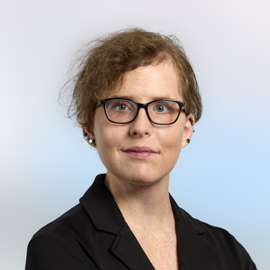
Elisa has been working as a research assistant at Fraunhofer ISI since February 2019 in the Policy and Society Department, Business Unit Societal Change and Innovation. She is primarily concerned with the evaluation of (innovation) policy measures and programs. Since November 2020, she has been working on her doctoral thesis at the University of Trier. She studied Social Sciences (B.A.) and International Criminology (M.A.). Before joining Fraunhofer ISI, she worked as a research assistant for the Max Planck Institute for Foreign and International Criminal Law on the WISKOS project; Economic and Industrial Espionage in Germany and Europe. This project also forms the background for her doctoral thesis which deals with illegal practices of knowledge leakage and the prevention of such incidents in small and medium-sized enterprises (SMEs) in Germany. The data basis for this stems from an online survey carried out in the project, which will be linked with other data sources that allow, among other things, the linking of the the number of cases with questions of innovation intensity in individual industries. The linking of the different data sources and the subsequent analyses are carried out using the statistical software Stata.
University of Trier